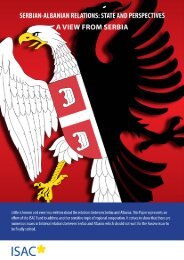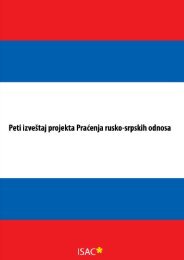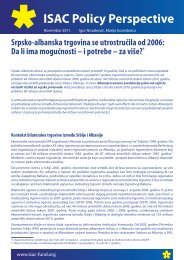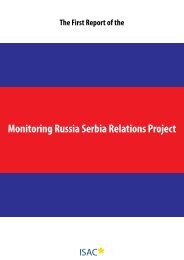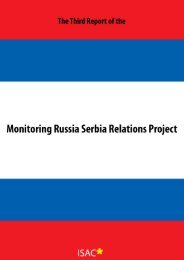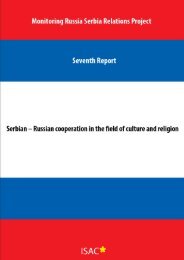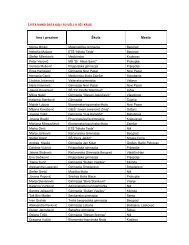the process of security sector reform - ISAC Fund
the process of security sector reform - ISAC Fund
the process of security sector reform - ISAC Fund
You also want an ePaper? Increase the reach of your titles
YUMPU automatically turns print PDFs into web optimized ePapers that Google loves.
Dr Timothy Edmunds THE PROCESS OF SECURITY SECTOR REFORM<br />
Narcís Serra TRANSITION TO DEMOCRACY AND MILITARY REFORM: POSSIBLE FRAMEWORK<br />
• SSR cannot be imposed from above, and <strong>the</strong> development <strong>of</strong> locallyowned<br />
strategies for <strong>reform</strong> is important. In many respects, <strong>the</strong> <strong>reform</strong><br />
<strong>process</strong> itself is more important than <strong>the</strong> imposition <strong>of</strong> a particular endpoint.<br />
• SSR must be problem driven ra<strong>the</strong>r than institution driven, and as such<br />
must address all <strong>security</strong> <strong>sector</strong> actors <strong>of</strong> relevance. In particular, <strong>the</strong> difficulties<br />
<strong>of</strong> conducting SSR in ‘difficult’ areas such as interior ministry<br />
forces or <strong>the</strong> intelligence services must be grappled with.<br />
Narcís Serra<br />
President <strong>of</strong> <strong>the</strong> CIDOB Foundation, Barcelona<br />
TRANSITION TO DEMOCRACY<br />
AND MILITARY REFORM:<br />
POSSIBLE FRAMEWORK<br />
In <strong>the</strong> last twenty-five years <strong>of</strong> <strong>the</strong> XX century, all <strong>the</strong> dictatorial regimes <strong>of</strong><br />
sou<strong>the</strong>rn Europe and Latin America went through a <strong>process</strong> <strong>of</strong> democratisation.<br />
Toge<strong>the</strong>r <strong>the</strong>y constitute <strong>the</strong> core what Samuel Huntington called <strong>the</strong> “third<br />
wave”. This, along with <strong>the</strong> fall <strong>of</strong> <strong>the</strong> Berlin wall, has come to constitute one <strong>of</strong><br />
<strong>the</strong> greatest collective instances <strong>of</strong> advancement towards democracy in recent<br />
times. As well, in <strong>the</strong> nineties, <strong>the</strong> Eastern European countries also began a long<br />
and difficult <strong>process</strong> <strong>of</strong> transition towards democracy.<br />
A feature common to all <strong>the</strong> Latin American countries is that such a transition to<br />
democracy was effected, without exception, from military regimes. More or less<br />
<strong>the</strong> same can be said, with <strong>the</strong> odd nuance, <strong>of</strong> <strong>the</strong> countries <strong>of</strong> sou<strong>the</strong>rn Europe.<br />
In all <strong>the</strong> Eastern European countries <strong>the</strong>re have been problems <strong>of</strong> adaptation<br />
<strong>of</strong> <strong>the</strong> armed forces to <strong>the</strong> normal functioning <strong>of</strong> democracy and in all <strong>of</strong> those<br />
countries this has given rise to problems <strong>of</strong> a change in values and a shift in<br />
pr<strong>of</strong>essional and ideological pr<strong>of</strong>ile given <strong>the</strong> relationship between <strong>the</strong> army and<br />
<strong>the</strong> Communist Party prior to such changes.<br />
An analysis <strong>of</strong> civil-military relationships would <strong>the</strong>refore seem essential if we<br />
wish to trace <strong>the</strong> democratic evolution <strong>of</strong> <strong>the</strong>se countries, where <strong>the</strong> <strong>process</strong> <strong>of</strong><br />
creation <strong>of</strong> democratic institutions and mechanisms for control over <strong>the</strong> military<br />
is crucial.<br />
With regard to Serbia and Montenegro it would be interesting to examine <strong>the</strong><br />
extent to which <strong>the</strong>se cases can help to decide <strong>the</strong> most adequate means <strong>of</strong><br />
guaranteeing civil control over <strong>the</strong> armed forces and explore whe<strong>the</strong>r <strong>the</strong>y provide<br />
guidelines for proceeding that can be applied to <strong>the</strong> Federation.<br />
26 27





